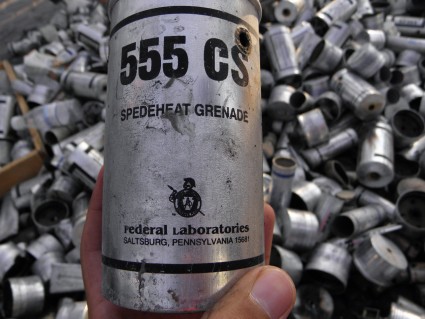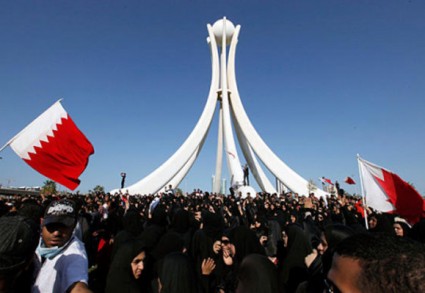Tear-gas shells replace the Pearl as the symbol of Bahrain
Tear-gas shells replace the Pearl as the symbol of Bahrain
Patrick Cockburn – 20 October, 2013 – PressTV
Two-and-a-half years ago the Bahrain government bulldozed the Pearl Monument, whose tall, graceful pillars held a giant pearl as a symbol of the island kingdom, because it had become the rallying point in the capital, Manama, for pro-democracy protesters. The authorities have never chosen a new symbol to replace the one they destroyed, but, if they do so, they might well like to consider the tear-gas shell or canister as best symbolising Bahrain as it is today. In keeping with this, the government has reportedly signed contracts with South Korean, German and South African firms for 1.6 million tear-gas shells of different calibres, giving it more than one projectile for every Bahraini citizen.
On every side there are signs of increased repression by the Sunni al-Khalifa royal family, which monopolises power in a country where Shia make up 60 per cent of the population. Between 2,400 and 3,000 people are in jail. In recent weeks, 50 Shia, including human-rights activists, were given up to 15 years in prison after the briefest of trials. Yousif al-Nashmi, allegedly tortured when detained by police, died in hospital soon after his release. The public prosecutor’s office said “the deceased was admitted to hospital on September 23 in a critical condition and was diagnosed with Aids”.
Two points have become clear during the 30 months since mass protests began on 14 February 2011: The protesters have not been cowed by persecution and the government has responded by turning Bahrain into a repressive police state. After tentative and unfulfilled promises of dialogue and reconciliation at the end of 2011, the monarchy reverted to reliance on force to crush the opposition. Significantly, the UN Special Rapporteur on Torture, Juan Mendez, has been twice denied entrance to Bahrain, most recently in April. A critic of the regime living in Bahrain, who did not want his name published, said that “over the last year torture has once again become the norm for anybody detained”.
Sensitivity to the degree to which Bahrain has apparently turned into an island of hate, with chasm-like divisions between rulers and ruled and between Sunni and Shia, was illustrated by the over-heated official reaction to President Obama’s reference to Bahrain in his speech to the UN General Assembly on 24 September. He had spoken mildly of “sectarian tensions that continue to surface in places like Iraq, Bahrain and Syria”, but Bahraini ministers queued up to deny that Bahrain had anything in common with Syria and Iraq. Interior Minister Sheikh Rashid bin Abdallah al-Khalifa, whose ministry is said to be importing industrial quantities of tear gas, said Bahrain had “never witnessed at any time sectarian tensions”. The Foreign Minister, Sheikh Khaled bin Ahmed al-Khalifa, claimed that the kingdom had fostered a culture of tolerance between different communities. He added that “what is occurring in Bahrain… is a concerted effort by terrorist extremist groups to target security personnel and expatriates with the intent of spreading fear and division”.
As with many authoritarian regimes over the centuries, the Bahraini government might find it difficult to ease repression even if it wanted to. The fears of the Bahraini Sunni community have been stoked by claims of the existence of terrorist plots inspired by Iran in support of its fellow Shia. But an independent inquiry led by the US-Egyptian legal authority, Cherif Bassiouni, on how Bahrain handled the unrest in 2011, found no evidence of Iranian involvement. Allegations of revolutionary intentions become self-fulfilling: Moderate bloggers and civil-rights activists who have been mistreated and given long sentences tend to be less moderate when they get out of jail.
Why have the al-Khalifas stepped up their efforts to crush the opposition over the summer? One reason is probably sheer frustration that 30 months after the first demonstrations at the Pearl Roundabout, protesters in Shia villages still confront police and hold marches. There is also an exaggerated perception in Bahrain – as in Saudi Arabia and in the other Gulf monarchies – that American power in the Middle East has declined more sharply than in fact it has. Thus the authorities felt free to arrest a prominent opposition leader, Khalil al-Marzouq, the Assistant Secretary General of al-Wefaq, the main opposition party, on 17 September. The opposition had hoped their leaders might enjoy limited protection because their detention would annoy Washington and Western Europe.
































Add facebook comments
Kick things off by filling out the form below.
Leave a Comment